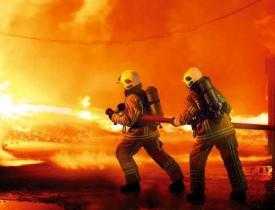Description
Course Name: Advance Diploma in Fire and Safety Management- Fire & Rescue Operator
Course Id: ADFSM/Q0001.
Education Qualification: 10th Pass.
Course Duration: 370 Hrs.
How You will Get Diploma Certificate:
Step 1- Select your Course for Certification.
Step 2- Click on Enroll Now.
Step 3- Proceed to Enroll Now.
Step 4- Fill Your Billing Details and Proceed to Pay.
Step 5- You Will be Redirected to Payment Gateway, Pay Course and Exam Fee by Following Options.
Card(Debit/Credit), Wallet, Paytm, Net banking, UPI and Google pay.
Step 6- After Payment You will receive Study Material and Online Examination link on your email id.
Step 7- After Completion of Course Study give Online Examination.
Step 8- After Online Examination you will get Diploma Certificate soft copy(Scan Copy) and Hard Copy(Original With Seal and Sign).
Step 9- After Certification you will receive Prospect Job Opportunities as per your Interest Area.
Online Examination Detail:
- Duration- 120 minutes.
- No. of Questions- 60. (Multiple Choice Questions).
- 10 Questions from each module, each carry 10 marks.
- Maximum Marks- 600, Passing Marks- 40%.
- There is no negative marking in this module.
| How Students will be Graded: | ||
| S.No. | Marks | Grade |
| 1 | 91-100 | O (Outstanding) |
| 2 | 81-90 | A (Excellent) |
| 3 | 71-80 | A (Very Good) |
| 4 | 61-70 | B (Good) |
| 5 | 51-60 | C (Average) |
| 6 | 41-50 | P (Pass) |
| 7 | 0-40 | F (Fail) |
Benefits of Certification:
- Government Authorized Assessment Agency Certification.
- Certificate Valid for Lifetime.
- Lifetime Verification of Certificate.
- Free Job Assistance as per your Interest Area.
Syllabus
Advanced Diploma in Fire & Safety Engineering
Safety, Health & Environmental Management
panning or safety, organization for safety, directing for safety, monitoring for safety, health and environment, monitoring for safety, health and environment, principles of accident prevention, safety, health and environment (she) education and training, employee participation in safety, management information system for safety, machine operation and guarding, safety in the use of machines, material handling and storage of materials, working at heights, hand tools and portable tools, plant design and housekeeping, industrial lighting & illumination, ventilation and heat stress, noise and vibration.
Safety, Engineering, Fire Prevention and Protection
Classification of fire, Portable fire extinguishers, Pumps and primers, Foam and foam making equipments, Hose and hose fittings, Water relay systems, Breathing apparatus, Small gears, Fire protective clothing, Ladders, Ropes and lines, bends & hitches, Fire prevention, Special appliances, Fire fighting codes and standards, Electrical fire hazards, Structures under fire, Site planning and housekeeping, Types of Scaffolds, Scaffold Erection & dismantling, Scaffold Inspection, Road work and pilling operation, Ladders, Use of safety nets and fall protection systems, Concrete and concert foams and shoring, Importance of civil work in construction industry, Material handling, Important safety requirements and inspections, Fundamentals of industrial safety, Different types of industries, Different types of safety systems and equipments, Safety policy and safety terminology.
Safety, Legislation, Occupational Health
Introduction to occupational health and safety, Sector specific occupational health and safety issues, Socio-economic aspects of occupational health and safety, Basics of preventive techniques, Health screening measures, Occupational health and safety legislation in India, Participatory research in occupational health, Learning Objectives, Overview of Existing OHS Legislation in India, Relevant Legislation in India, The Factories Act, The Mines Act, The Workmen’s Compensation Act, The Employees’ State Insurance Act, Inadequacy of OHS Legislation in India, Summary, Glossary of Terms, References, Recommended Readings, Annexure, Guidelines from the Factories Act, Guidelines from the Mines Act.
Occupational Health & Industrial Hygiene
Learning objectives, Historical incidents, Elements of the work Environment, Questions and Exercises, Classifications of occupational health, safety and hygiene hazards, Evaluation of Occupational environment, Questions and Exercises, Type of small scale enterprises, and informal sectors, General actions on small enterprises and informal sectors, Prevention and control methods of occupational hygiene and safety Hazards, Personal Protective equipment, Plant Sanitation, Good Housekeeping and Maintenance, Emergency response training and education, Simple hand tools are the cause of many accidents, Moving part of machinery is securely fenced.
Risk Management & Permit to Work System
Fire Science, – Construction Safety, Industrial Safety Management, Environmental studies, Fire Technology, Security Management of Industries, Industrial Safety Management, Value Education – Human Rights, -Legal Aspects of Safety, Occupational Safety, First Aid & Emergency Procedures, Communicative English, Occupational Health & Safety Standards, Scaffolding, Scaffolding – Practical, Disaster Management, Industrial Psychology, Safety in Power Plants, Controlling of Environmental Pollution, Safety Training, Principles of Risk Management, History of fire service – Basic physics, Basic Chemistry and physics of fire, Fire prevention & Control, Fixed fire fighting installations using water, Fixed fire fighting installations not using water- Ropes & Drills.
Controlling environment pollution
Basic Concepts in Nature, Human Impact on Environment, Natural Resources Management, Pollution Monitoring and Control, Project and Assignment, Basic concepts in Ecology, Environmental Science, Ecosystem, Population Ecology, Habitat, Major ecosystems of the world, Human Impact on Environment, Environmental degradation, causes and effects, Population pressure, Concept of development, Global environmental issues, Pollution, Monitoring and Control of Air, Water, Soil, Solid waste, Measures for Environmental Protection, Environmental Impact Assessment, Natural Resources Management, Natural Resources.

